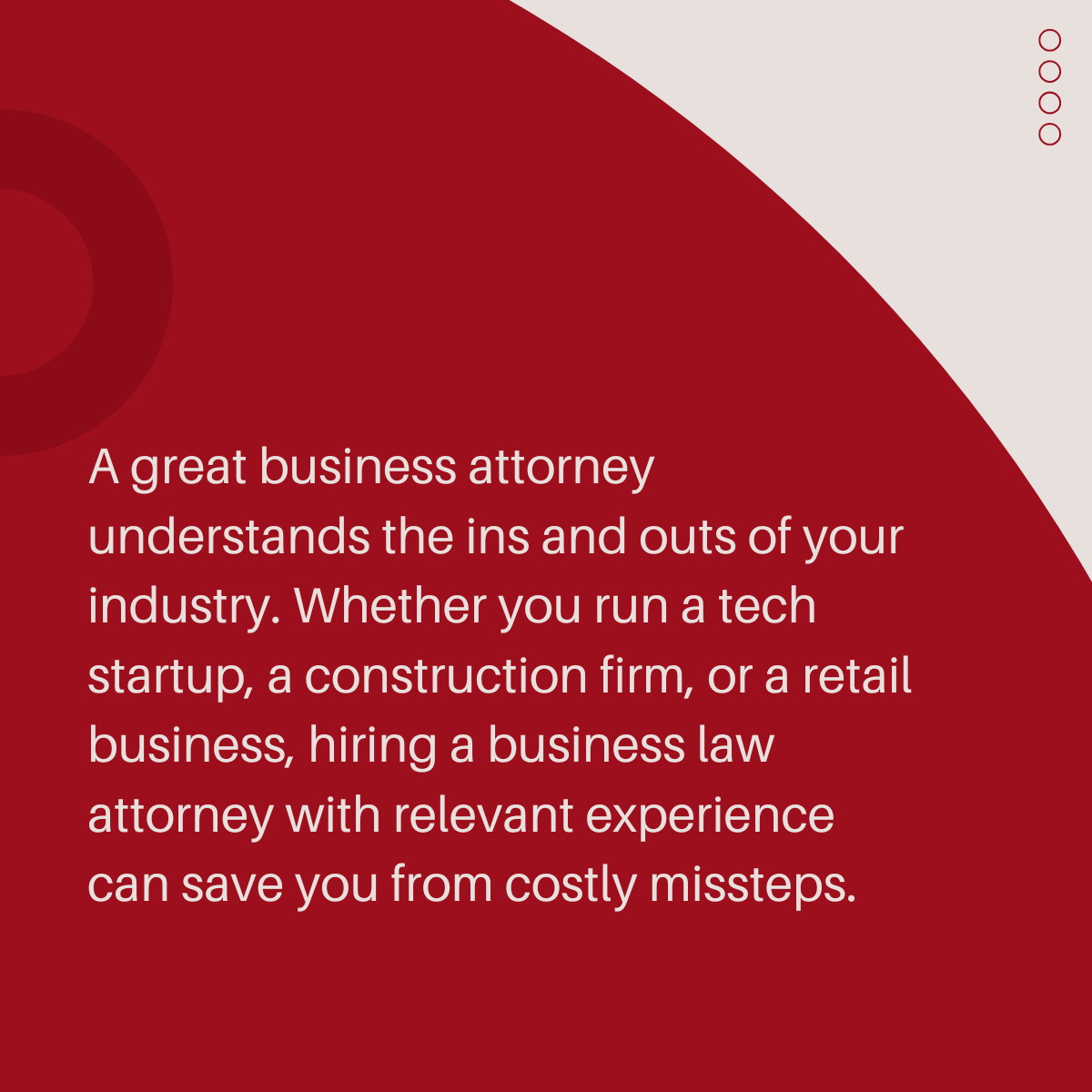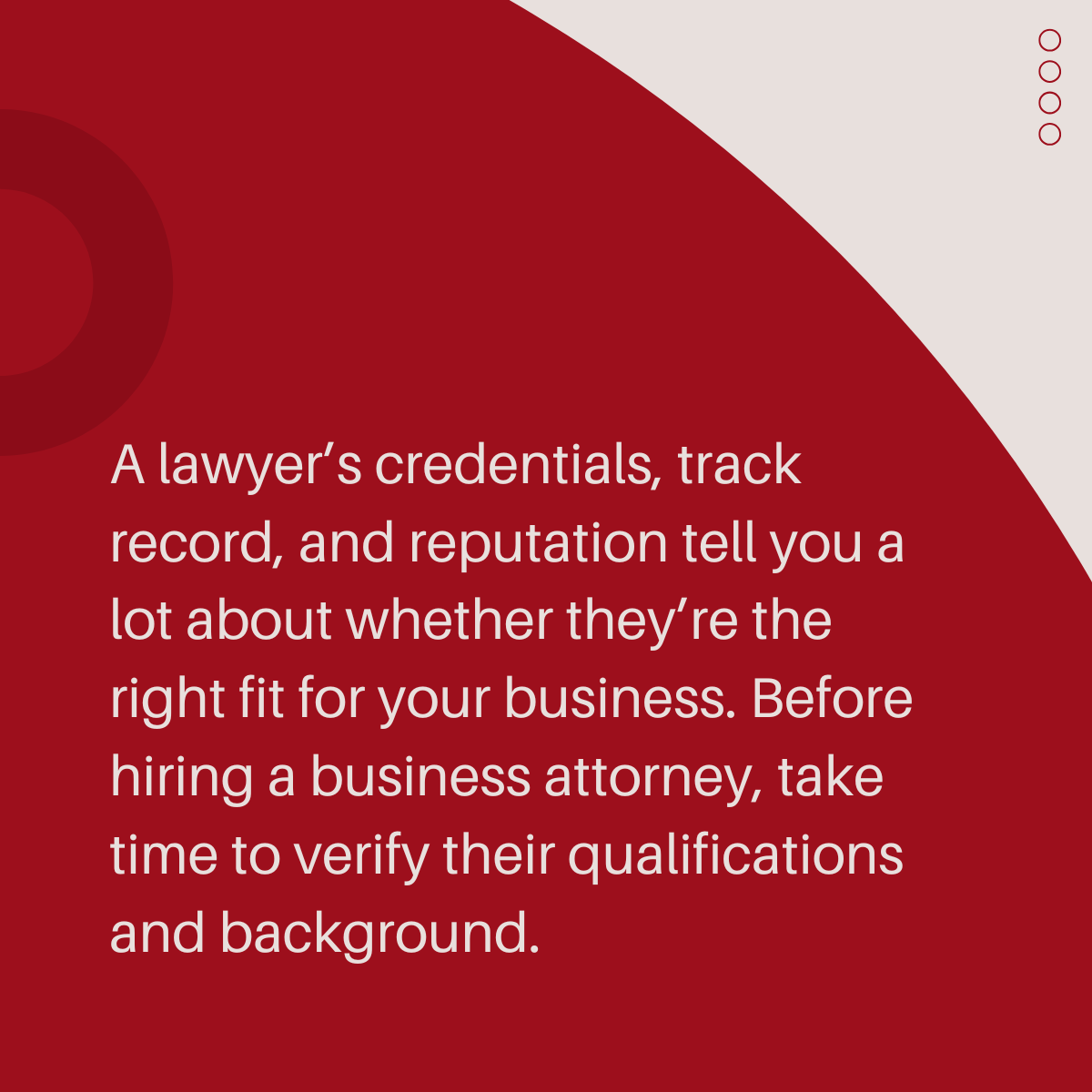
How to Find a Business Attorney
THE INFORMATION INCLUDED IN THIS BLOG POST IS FOR INFORMATIONAL PURPOSES ONLY AND DOES NOT CONSTITUTE ADVERTISING, A SOLICITATION, OR LEGAL ADVICE, AND SHOULD NOT REPLACE YOUR CONSULTATION WITH A LAWYER CONCERNING YOUR PARTICULAR NEEDS.
Resolving, responding to, or otherwise managing legal issues aren’t something most business owners think about—until they have to. Whether you’re launching a startup, signing contracts, or facing a dispute, having a business attorney on your side can save you time, money, and stress.
You might be searching for a business law attorney nearby to help with agreements, compliance, or negotiations. Or maybe you need a business transactions lawyer for mergers, acquisitions, or structuring deals. Either way, choosing the right business law attorney is a decision that can protect your business for years to come.
This guide breaks down a few things to look for, key considerations when hiring, and how to make sure your legal needs are covered so you can focus on running your business with confidence.
How to Find a Business Law Attorney
1. Identify Your Legal Needs
Not all business law attorneys handle the same types of legal matters. For example, some may specialize in business transactions law, helping with contracts, mergers, and acquisitions, while others focus on litigation, defending businesses in legal disputes. Understanding what kind of legal support you need will help narrow your search.
Here are some common areas where a business law attorney near you can assist:
- Entity Formation – Setting up an LLC, corporation, or partnership with the right legal structure.
- Contracts & Agreements – Drafting, reviewing, and negotiating business contracts.
- Employment Law Compliance – Ensuring hiring practices, workplace policies, and terminations follow labor laws.
- Mergers & Acquisitions – Handling complex transactions and due diligence.
- Regulatory & Licensing Compliance – Navigating industry-specific laws and obtaining necessary permits.
- Litigation & Disputes – Representing your business in lawsuits, disputes, or settlements.

2. Look for Experience in Your Industry
A great business law attorney understands the ins and outs of your industry. Whether you run a tech startup, a construction firm, or a retail business, hiring a business law attorney with relevant experience can save you from costly missteps.
Here’s a few reasons why industry-specific expertise matters:
- Tech & Startups – When needing help with intellectual property, data privacy laws, or venture capital agreements, a business transactions lawyer with experience in tech can ensure your business is legally protected.
- Retail & E-Commerce – From vendor agreements to advertising compliance, a lawyer with retail experience can help you navigate the fine print.
- Healthcare & Medical Practices – If you’re in the healthcare industry, you need a lawyer who understands HIPAA regulations, licensing requirements, and employment contracts for medical professionals.
- Real Estate & Construction – From property leases to zoning laws, a real estate lawyer can ensure your deals are legally sound.
When searching for a lawyer, ask about their past clients, case studies, or industries they specialize in. A lawyer who understands your field can offer better advice and protect your business from industry-specific risks.
3. Consider Local and State Expertise
Business laws aren’t universal. What works in one state might be completely different in another. Hiring a business law attorney who understands state and local laws is important for many reasons, a few of which are as follows:
- Contracts That Hold Up in Court – Business agreements need to be enforceable under your state’s laws. A business law attorney will make sure contracts, including non-disclosure agreements (NDAs) and partnership agreements, are legally sound.
- Licensing & Permits – Some industries require special licenses or permits, and failing to secure them can shut you down before you even get started.
- Employment Laws & Regulations – Hiring, firing, wage laws, and worker classification (employee vs. independent contractor) all come with legal risks. Getting this wrong can lead to lawsuits or penalties from labor boards.
- Dispute Resolution & Litigation – If you ever end up in a legal dispute, having a local attorney who understands how state courts operate and has experience with local judges and opposing attorneys gives you a huge advantage.

4. Check Credentials and Reputation
A lawyer’s credentials, track record, and reputation tell you a lot about whether they’re the right fit for your business. Before hiring a business law attorney, take time to verify their qualifications and background.
What to Look For:
- Bar Membership & Licensing – Make sure your lawyer is licensed to practice in your state. You can verify this through your state’s bar association website. For instance, here’s The State Bar of California’s Attorney Search.
- Specialization in Business Law – A general practitioner might not be the best fit. Look for a business transactions lawyer with experience in contracts, mergers, compliance, and other business-related legal matters.
- Client Reviews & Testimonials – Check online reviews, legal directories, and testimonials to see what past clients say about them.
- Industry Experience – If you’re in a highly regulated field (such as healthcare, finance, or construction), an attorney who understands your industry’s challenges is a major plus.
- Case Results & References – If possible, ask for examples of how they’ve helped businesses like yours. A good attorney should have case studies or references from past clients.
5. Assess Communication and Availability
A business law attorney isn’t just someone you call when things go wrong. They should be a reliable advisor who helps you avoid legal trouble in the first place. That’s why clear communication and accessibility are just as important as expertise.
Here’s why constant communication matters:
- Legal Jargon Simplified – A great business transactions lawyer can explain complex legal matters in plain English, so you know exactly what’s going on with your contracts, compliance, or disputes.
- Responsiveness – If your attorney takes days or weeks to reply, that’s a problem, especially when business decisions are time-sensitive. Look for someone who responds promptly.
- Proactive Legal Advice – A good business law attorney helps you anticipate risks and stay ahead of potential legal issues.
6. Fee Structures and Billing
Legal services can be a significant investment, so knowing how a business law attorney charges for their work is also beneficial. The last thing you want is unexpected legal fees that eat into your budget.
Here are the common fee structures for business law attorneys:
- Hourly Rate – Many attorneys bill by the hour, with rates varying based on experience, location, and complexity of the work. If you’re working with a high-profile business transactions lawyer, expect a higher rate.
- Flat Fees – For predictable legal tasks like drafting contracts or reviewing documents, some attorneys offer flat-rate pricing. This can be a cost-effective option.
- Retainer Agreements – If you need ongoing legal support, a business law attorney might offer a retainer model where you pay a set amount upfront for a certain number of hours each month.
- Contingency Fees – Less common in business law, but some attorneys may work on contingency for cases involving financial settlements, meaning they only get paid if you win.

Contact DMAB
Legal issues can arise at any time, so it’s better to establish a relationship with a trusted business transactions lawyer before you actually need one. If you’re looking for experienced, reliable legal support, DMAB is here to help. Contact us today to discuss how we can support your business with expert legal guidance.
